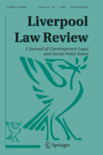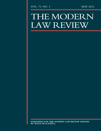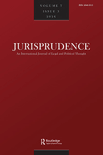
COLUMBIA LAW REVIEW
metrics 2024
Transforming Legal Perspectives, One Article at a Time
Introduction
COLUMBIA LAW REVIEW, published by the COLUMBIA JOURNAL TRANSNATIONAL LAW ASSOCIATION, is one of the foremost legal journals in the United States, committed to advancing the discourse on critical legal issues. With an ISSN of 0010-1958 and an E-ISSN of 1945-2268, this prestigious publication has established a strong reputation, reflected in its Q1 rank in Law and a Scopus ranking of #145 out of 1025 journals in the social sciences category, placing it in the 85th percentile. COLUMBIA LAW REVIEW serves as a vital platform for legal scholars, practitioners, and students, publishing notable articles, case studies, and commentaries that influence both academic and practical perspectives on law. With a publication history spanning multiple decades, from its converged years of 1973 to 2024, it remains a key resource for those looking to stay updated on contemporary legal thought and developments. While it operates under a traditional subscription model, the journal’s rigorous peer-review process ensures the highest quality of scholarship in the legal field, solidifying its importance for both emerging and established legal professionals.
Metrics 2024
 1.10
1.10 3.40
3.40 2.70
2.70 80
80Metrics History
Rank 2024
Scopus
IF (Web Of Science)
JCI (Web Of Science)
Quartile History
Similar Journals

Liverpool Law Review
Fostering Dialogue in the Evolving Landscape of LawLiverpool Law Review, published by Springer, is a prestigious open-access journal in the field of law, dedicated to fostering scholarship and promoting dialogue on contemporary legal issues. Since its inception, the journal has evolved significantly, with a publishing history dating back to 1979 and showcasing an extensive range of articles and reviews that contribute to the development of legal theory and practice. The journal is indexed under Scopus, ranking #352 out of 1025 in the Social Sciences category, placing it in the 65th percentile—indicative of its solid reputation and relevance in the field. Liverpool Law Review provides an engaging platform for researchers, professionals, and students alike by facilitating access to high-quality legal research, with full open access available since 2012, ensuring that vital academic discussions are accessible to a global audience. With its commitment to exploring both historical and contemporary issues in law, this journal remains an essential resource for those seeking to deepen their understanding and contribute meaningfully to the legal landscape.

HARVARD LAW REVIEW
Pioneering Critical Perspectives in Law.HARVARD LAW REVIEW, an esteemed publication by the Harvard Law Review Association, stands as a cornerstone of legal scholarship in the United States, boasting an impressive ISSN of 0017-811X and E-ISSN 2161-976X. Renowned for its rigorous editorial standards and comprehensive analyses, this journal occupies the prestigious Q1 category in Law, ranking #149 out of 1025 in Scopus, which places it in the 85th percentile among its peers in the Social Sciences Law category. With a publication history stretching from 1973 to 2024, it consistently features groundbreaking articles, influential essays, and critical commentaries that shape contemporary legal thought. Although not an open-access journal, HARVARD LAW REVIEW remains indispensable for researchers, professionals, and students who seek to engage deeply with the evolving landscape of law. Its rigorous academic focus empowers scholars and practitioners alike, making it a vital resource in the field.

Ius Humani-Revista de Derecho
Empowering Legal Minds Through Open AccessIus Humani-Revista de Derecho, published by Universidad Hemisferios, serves as a vital platform for discourse in the field of human rights law and its various dimensions. With an Open Access policy established since 2008, this journal ensures that scholarly articles, critical reviews, and original research are readily accessible to a global audience, fostering collaboration and innovation among researchers, professionals, and students alike. Although the journal is based in Quito, Ecuador, its reach extends internationally, making significant contributions to the understanding and application of human rights in legal frameworks. While it is still developing in terms of its HIndex and Scopus rankings, Ius Humani is poised to provide essential insights and discussions that reflect pressing legal issues and emerging trends in human rights law. Join the community of scholars engaging with this important field through Ius Humani, where knowledge is freely shared and impactful conversations are sparked.

MODERN LAW REVIEW
Advancing Contemporary Legal Scholarship.MODERN LAW REVIEW, a prestigious academic journal published by Wiley, stands as a significant platform in the field of law, dedicated to exploring contemporary legal issues and fostering scholarly discourse since its inception in 1937. With an impressive Scopus Rank of #237 out of 1025 in the Social Sciences - Law category, placing it in the 76th percentile, the journal has consistently maintained a reputation for high-quality research, currently positioned in Q2 of the category quartiles as of 2023. The journal's comprehensive coverage spans various legal topics, making it essential reading for legal scholars, practitioners, and students alike. Although it is not an open-access journal, its contributions are invaluable for guiding the future of legal scholarship. With a robust history of converged years from 1995, 1997 to 1999, 2001 to 2002, 2004, and 2011 to 2024, MODERN LAW REVIEW remains at the forefront of legal research, addressing pressing issues and influencing legal thought across disciplines.

BOSTON UNIVERSITY LAW REVIEW
Elevating discourse in legal theory and practice.BOSTON UNIVERSITY LAW REVIEW, a premier legal journal based in the United States, is widely recognized for its contributions to the field of law. Since its inception in 1973, this esteemed publication, with ISSN 0006-8047, has provided a platform for rigorous scholarship and innovative discourse in legal theory and practice. Published by BOSTON UNIV LAW REVIEW, the journal is categorized in the top-tier Q1 of law journals as of 2023, reflecting its high impact and relevance in legal scholarship, backed by a solid Scopus ranking of #219 out of 1025 in Social Sciences _ Law, placing it in the 78th percentile. While not an open-access journal, it remains a vital resource for legal researchers, practitioners, and students, offering comprehensive analyses and insights that inform contemporary legal practices. With a commitment to advancing legal understanding, the BOSTON UNIVERSITY LAW REVIEW seeks to engage and inspire critical thought among its readership.

AUSTRALIAN LAW JOURNAL
Advancing Legal Knowledge, One Article at a TimeThe Australian Law Journal, published by Lawbook Co Ltd, has long been a cornerstone in the legal scholarly community, serving as a vital resource for legal practitioners, scholars, and students since its inception. With an ISSN of 0004-9611, this esteemed journal provides a platform for a diverse array of legal discourse, ranging from analyses of contemporary law to examination of historic legal principles. Though traditionally not open access, the journal continues to uphold a commitment to excellence through a rigorous peer-review process, thus ensuring high-quality research dissemination. The journal's extensive archives reflect its long-standing relevance, covering various periods including 1974 onward, with significant contributions made between 1976 to 1978, 1986 to 1988, and 1993, among others. Engaging with this publication is essential for those seeking to advance their understanding of Australian law and its application, making it an invaluable resource for anyone involved in legal studies or practice.

UNIVERSITY OF CINCINNATI LAW REVIEW
Bridging Theory and Practice in LawUNIVERSITY OF CINCINNATI LAW REVIEW is a distinguished academic journal in the field of legal studies, published by the University of Cincinnati College of Law. With an ISSN of 0009-6881 and an E-ISSN of 1942-8391, this journal serves as an essential platform for the dissemination of scholarly research and critical discourse in law. The review covers a wide range of topics, including constitutional law, contracts, criminal law, and legal theory, appealing to both practitioners and scholars alike. Although it is not open access, the journal maintains a significant influence with an HIndex reflecting its academic impact. As part of the Social Sciences - Law category, it ranks 434 out of 685 journals in Scopus, placing it within the 36th percentile, underscoring its valuable contribution to legal scholarship. Research featured in the University of Cincinnati Law Review aims to foster a deeper understanding of legal issues and stimulate ongoing academic conversations, making it an invaluable resource for anyone engaged in the study or practice of law.

Jurisprudence-An International Journal of Legal and Political Thought
Cultivating Rigorous Scholarship in JurisprudenceJurisprudence: An International Journal of Legal and Political Thought, published by ROUTLEDGE JOURNALS, TAYLOR & FRANCIS LTD, serves as a vital platform for scholars and practitioners engaged in the ever-evolving discourse of legal and political theory. With its ISSN 2040-3313 and E-ISSN 2040-3321, this esteemed journal spans a converged period from 2015 to 2024, and has established itself in the Q2 quartile of the law category, ranking #359 out of 1025 and placing in the 65th percentile as per Scopus metrics in 2023. Based in the United Kingdom, this journal is dedicated to exploring the intricate relationships between law, political ideologies, and contemporary societal issues, thereby fostering interdisciplinary dialogue that is crucial for navigating today’s complex legal landscapes. Although it does not currently provide an open access option, Jurisprudence continues to attract a broad readership of researchers, professionals, and students seeking rigorous scholarship and practical insights into legal and political thought. With its strong impact within the field, the journal plays a significant role in shaping future discussions and advancements in legal studies.

UNIVERSITY OF CHICAGO LAW REVIEW
Cultivating Excellence in Legal Scholarship and PracticeUniversity of Chicago Law Review is a prestigious academic journal dedicated to advancing legal scholarship, published by the University of Chicago Law School. Renowned for its rigorous peer-review process and high editorial standards, this journal is recognized as a leader in the field of law, achieving a Q1 ranking in the 2023 category of Law and occupying a notable position within the Scopus rankings, specifically at #199 out of 1025 in the Social Sciences - Law category, placing it in the 80th percentile. The journal provides an essential platform for legal scholars, practitioners, and students to engage with cutting-edge research and theory across various legal disciplines, including constitutional law, criminal law, and comparative law. With a commitment to fostering critical discourse, the University of Chicago Law Review has been instrumental in shaping legal thought, making it a vital resource for anyone seeking to contribute to or understand the evolving landscape of legal studies. Although it does not currently offer open access, subscription options provide robust access to its extensive archive of scholarly articles since its inception.

TEXAS LAW REVIEW
Advancing Legal Thought Since 1977TEXAS LAW REVIEW, an esteemed legal journal published by TEXAS LAW REVIEW PUBL INC, stands as a pivotal resource in the field of law, contributing significantly to legal scholarship since its inception. With an ISSN of 0040-4411 and an E-ISSN of 1942-857X, this journal is recognized for its rigorous analysis of pressing legal issues and case law, making it essential reading for legal practitioners, scholars, and students alike. Positioned in the Q2 category for Law (2023), and ranked 343 out of 1025 in the Scopus database, TEXAS LAW REVIEW holds a commendable 66th percentile, highlighting its influence among legal publications. While it does not offer open access, the journal ensures that its high-quality articles are accessible to a wide range of legal audiences. Based in Austin, Texas, the journal's continuous evolution since 1977 reflects its commitment to adapting legal discourse to contemporary challenges, thereby cementing its status as a vital platform for those dedicated to understanding and shaping the legal landscape.